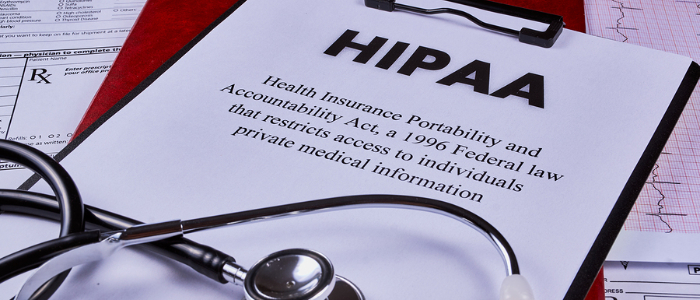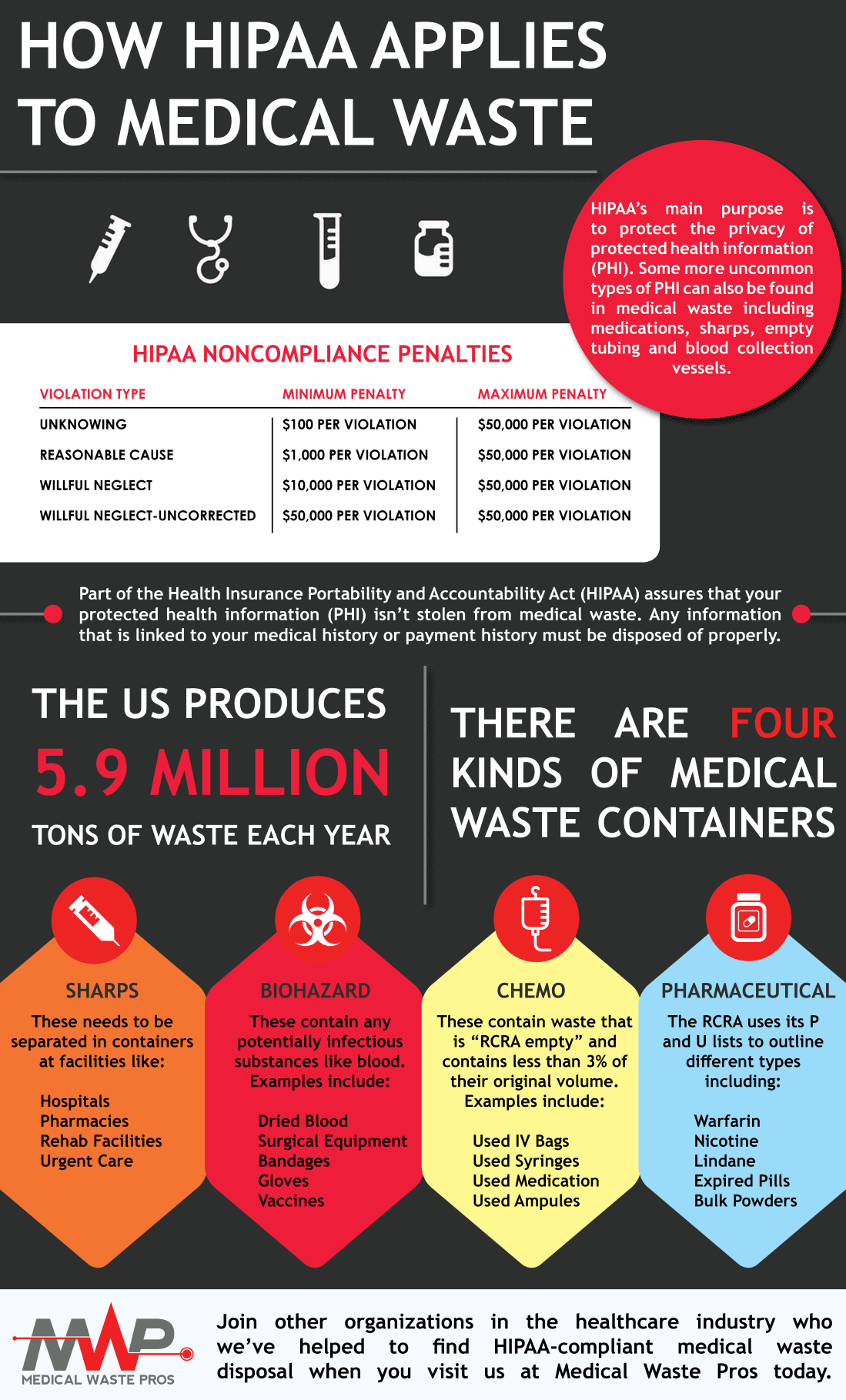Does HIPAA Apply to Medical Waste?

HIPAA’s main purpose is to protect the privacy of protected health information (PHI), and although traditional medical records are typically what comes to mind, there can also be PHI in types of medical waste like:
- Blood collection vessels
- Medications
- Specimen cups
- Sharps
- Empty IV bags & tubing
If you would like to learn more about what kinds of medical waste HIPAA covers, you can watch the video or read the transcript below.
Video Transcript
What Is HIPAA?
Enacted in 1996, HIPAA requires covered entities to implement any safeguards needed to protect the privacy of PHI in any form to limit incidental and prohibited uses or disclosures of PHI—including during disposal. In addition, it gives patients rights over their health information, including the right to access their records and request corrections. Overall, the goal is to ensure to properly protect PHI while still allowing the flow of health information needed to promote high-quality care.
HIPAA Noncompliance Penalties
Whether accidental or intentional, HIPAA violations will always come with financial penalties—in some cases as high as 7 digits. When it comes to intentional or repeated violations, the fine may also come with handcuffs.
| Violation Type | Minimum Penalty | Maximum Penalty |
| Unknowing | $100 per violation–Max $25,000 annually | $50,000 per violation–Max $1.5 million annually |
| Reasonable Cause | $1,000 per violation–Max $100,000 annually | $50,000 per violation–Max $1.5 million annually |
| Willful Neglect | $10,000 per violation–Max $250,000 annually | $50,000 per violation–Max $1.5 million annually |
| Willful Neglect–Uncorrected | $50,000 per violation–Max $1,000,000 annually | $50,000 per violation–Max $1.5 million annually |
HIPAA-Compliant Medical Waste Disposal
While you can find most PHI in electronic or paper medical records, the U.S. produces 5.9 million tons of waste each year, making it just as important to safely dispose of medical waste and the potential PHI it contains. You need to dispose of all medical waste, however, multiple forms of medical waste require specific disposal methods.
Safe Sharps Disposal
Sharps are used in a variety of places and for a variety of reasons, making them one of the most common medical waste types. Sharps that have patient names, medical record numbers, or other identifying information on them, would be considered to contain PHI. Even if the sharps themselves don’t have PHI directly on them, if they are in containers or bags that identify a specific patient, they would be associated with that patient’s PHI.
Simply throwing sharps with PHI into the regular trash would be a violation of HIPAA, as it could lead to an unauthorized disclosure of the patient’s private information. Therefore, HIPAA requires the proper segregation, containment, and disposal to maintain compliance when sharps contain PHI.
 Red Bag Disposal for Hazardous Waste
Red Bag Disposal for Hazardous Waste
Red bags are designated for biohazardous waste that contains any potentially infectious substances like blood. If the red bags or containers contain any PHI, the HIPAA requirements would apply for proper disposal to prevent unauthorized disclosure. Common examples of biohazardous waste include:
- Items with dried blood & fluids
- Discarded surgical equipment
- Bandages, gloves, & gowns
- Blood-soaked materials
- Discarded vaccines
- Pathological waste
- Cytotoxic waste
Black and Yellow Containers for Chemotherapeutic Waste
Yellow waste containers are for chemotherapeutic waste that the EPA standards consider “RCRA empty.” While black is used for bulk waste, yellow containers are designated for chemo waste that’s “RCRA empty”, meaning the materials are empty and have less than 3% of their original volume remaining:
- Used ampules and vials
- Used IV bags & tubing
- Used syringes and needles
- Used medications
- Pathological chemo waste
- P-listed substances & containers
If chemotherapy waste containers have patient names, medical record numbers, or other identifying information on them, they would be considered to contain PHI under HIPAA. Therefore, you must dispose of them in a manner that protects the confidentiality of the information and prevent unauthorized access.
Blue Containers for Hazardous Pharmaceutical Waste
Blue medical waste containers are designated for RCRA-defined types of hazardous pharmaceutical waste. The RCRA uses its P and U lists to outline and different types of hazardous waste, including:
- Warfarin
- Nicotine
- Lindane
- Cyclophosphamide
- Expired/unused pills & injectables
- Bulk powders
If these blue pharmaceutical waste containers have patient names, medical record numbers, or other identifying information on them, HIPAA considers them to contain PHI. Therefore, you must dispose of it properly.
Prescription Bottles
Labeled prescription bottles, hospital identification bracelets, specimen cups, IV bags and other devices that have patient names or other PHI printed on them are also covered under HIPAA disposal requirements. You can’t throw these in public trash bins and must have the PHI removed or the item destroyed before disposal.
However, you can’t recycle pill bottles in the curbside recycling services due to the plastic they’re made of. Medical Waste Pros offers mail-back pill bottle recycling services that will dispose of them in an environmentally-friendly way.
In Need of HIPAA-Compliant Medical Waste Disposal?
Medical Waste Pros has helped numerous healthcare organizations with their secure and compliant medical waste disposal needs. To join them and let us help you with your medical waste disposal, fill out our form or give us a call at (888) 755-6370 for a free, no-obligation quote from providers in your area.










